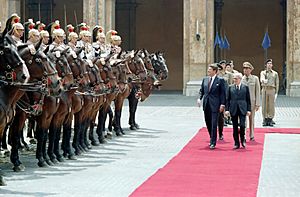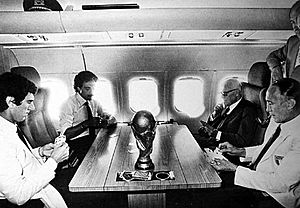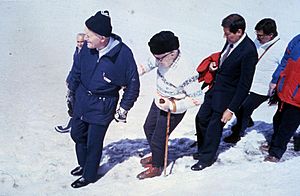Sandro Pertini facts for kids
Quick facts for kids
Sandro Pertini
OMCA
|
|||||||||||||||||||||||
|---|---|---|---|---|---|---|---|---|---|---|---|---|---|---|---|---|---|---|---|---|---|---|---|
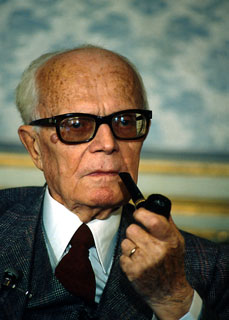 |
|||||||||||||||||||||||
| President of Italy | |||||||||||||||||||||||
| In office 9 July 1978 – 29 June 1985 |
|||||||||||||||||||||||
| Prime Minister | Giulio Andreotti Francesco Cossiga Arnaldo Forlani Giovanni Spadolini Amintore Fanfani Bettino Craxi |
||||||||||||||||||||||
| Preceded by | Giovanni Leone | ||||||||||||||||||||||
| Succeeded by | Francesco Cossiga | ||||||||||||||||||||||
| President of the Chamber of Deputies | |||||||||||||||||||||||
| In office 5 June 1968 – 4 July 1976 |
|||||||||||||||||||||||
| Preceded by | Brunetto Bucciarelli-Ducci | ||||||||||||||||||||||
| Succeeded by | Pietro Ingrao | ||||||||||||||||||||||
| Secretary of the Italian Socialist Party | |||||||||||||||||||||||
| In office 1 August 1945 – 18 December 1945 |
|||||||||||||||||||||||
| Preceded by | Pietro Nenni | ||||||||||||||||||||||
| Succeeded by | Rodolfo Morandi | ||||||||||||||||||||||
|
|||||||||||||||||||||||
| Personal details | |||||||||||||||||||||||
| Born |
Alessandro Pertini
25 September 1896 Stella, Kingdom of Italy |
||||||||||||||||||||||
| Died | 24 February 1990 (aged 93) Rome, Italy |
||||||||||||||||||||||
| Political party | PSU (1924–1930) PSI (1930–1990) |
||||||||||||||||||||||
| Spouse |
Carla Voltolina
(m. 1946) |
||||||||||||||||||||||
| Alma mater | University of Genoa University of Modena and Reggio Emilia University of Florence |
||||||||||||||||||||||
| Signature | |||||||||||||||||||||||
Alessandro "Sandro" Pertini (born September 25, 1896 – died February 24, 1990) was a famous Italian politician. He was a member of the Socialist Party and served as the President of Italy from 1978 to 1985. People loved him for his honesty and strong beliefs.
Contents
Early Life and Education
Sandro Pertini was born in Stella, Italy, into a wealthy family. He went to school in Varazze and Savona. His teacher, Adelchi Baratono, was a socialist who influenced his ideas about fairness and helping others. Pertini later studied law at the University of Genoa.
When he was 19, World War I started. Even though he didn't agree with the war, he joined the army. He was a brave soldier and received awards for his courage. After the war, he joined the Socialist Party. He continued his studies in Florence, where he met other important thinkers like Gaetano Salvemini. Pertini was sometimes attacked by Fascist groups because of his beliefs, but he never gave up.
Fighting Against Fascism
After a socialist leader named Giacomo Matteotti was killed by Fascists in 1924, Pertini became even more determined to fight against the totalitarian government. In 1926, he was sentenced to prison but managed to hide. He then helped another important socialist, Filippo Turati, escape to France. Pertini stayed in France for a while, working as a mason.
When he returned to Italy, he was arrested in Pisa and sentenced to ten years in prison. In 1935, he was sent to an island called Santo Stefano Island, where he stayed until 1943. Even though he became very sick, he never asked for a pardon.
He was released after Benito Mussolini was arrested. Pertini then joined the Italian resistance movement to fight against the Nazi German soldiers and Mussolini's new government. He was arrested by the Germans and sentenced to death, but brave partisans rescued him. Pertini then went north to help organize the resistance. He played a key role in the uprising in Milan on April 25, 1945, which led to Mussolini's execution.
Becoming a Leader
After World War II ended in Italy, and the country became a republic, Pertini was elected to the Constituent Assembly. This group helped create Italy's new Constitution. He became an important member of the Italian Socialist Party.
Pertini was very honest and spoke out against colonialism (when one country controls another). He also criticized corruption in the Italian government and even within his own party. In 1968, he was elected president of the Italian Chamber of Deputies, which is like the speaker of one of Italy's main government bodies.
President of Italy (1978–1985)
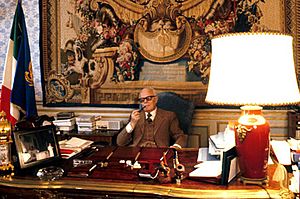
In 1978, at 81 years old, Sandro Pertini was elected President of the Italian Republic. This is the highest office in the country. Even though he was older, he was full of energy. He helped people trust the government again and traveled a lot, meeting leaders from other countries.
During a time of terrorism in Italy, Pertini openly spoke out against the violence. He also opposed organized crime, the unfair system of apartheid in South Africa, and dictatorships in other countries like Chile. He also spoke against the Soviet invasion of Afghanistan.
In 1981, he oversaw the creation of a new government led by Giovanni Spadolini. This was the first time in many years that the government was not led by the Christian Democratic party.
In 1985, he finished his term as president and automatically became a senator for life. He continued to work for peace and understanding between countries. In 1988, he received the Otto Hahn Peace Medal for his work. Sandro Pertini passed away in February 1990 at the age of 93. Many people across Italy mourned his death.
The 1982 World Cup Victory
President Pertini was a big football fan! He attended the 1982 FIFA World Cup Final in Madrid to watch Italy play against West Germany. After Italy scored their third goal, he famously wagged his finger and said, "they [the German team] will not catch us any more."
There are memorable photos of Pertini standing on his chair, cheering for Italy's victory. Another famous image shows him playing cards on the plane back home with the coach and some players, with the World Cup trophy right there on the table!
Paolo Rossi, who was Italy's top scorer in the tournament, later said that when President Pertini welcomed the team at the Presidential Palace, he told them, "This is my best day as President."
Friendship with Pope John Paul II
Sandro Pertini had a close friendship with Pope John Paul II. They met often for official events and also privately, and they frequently talked on the phone. Pertini, who was not religious, once said that he felt his mother, who was religious, was looking down from heaven, happy that her son was friends with the Pope.
On May 13, 1981, when he heard that the Pope had been shot, Pertini immediately went to the hospital. He stayed there late into the night until he was sure the Pope was out of danger. He later spoke about this event in his annual New Year's Eve speech to the Italian people.
Honours and Awards
In 1986, Sandro Pertini received the Freedom Medal for his dedication to human rights and freedom.
Images for kids
See also
 In Spanish: Sandro Pertini para niños
In Spanish: Sandro Pertini para niños
 | Emma Amos |
 | Edward Mitchell Bannister |
 | Larry D. Alexander |
 | Ernie Barnes |


